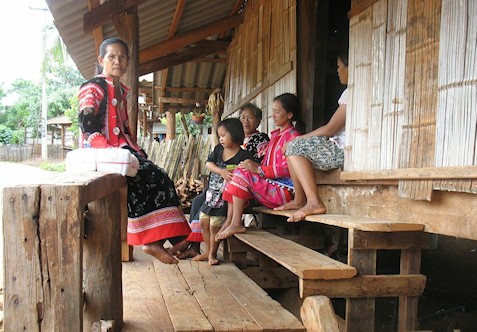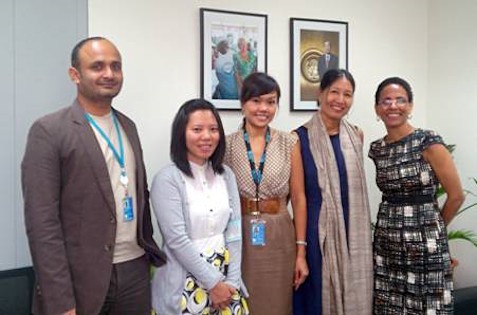Indigenous Women leaders trained to negotiate their way out of poverty
Date:
One hundred indigenous women’s rights advocates will be trained to raise their problems on violated land right and claim for their denied access to natural resources with parliamentarians.

Lahu women from Kongphakbing village, Thailand. Photo credit: Shimreichon Luithui
A ten-month training programme starting in July, “Strengthening the Documentation and Advocacy Capacity of Indigenous Women for the Advancement of their Rights and Welfare on Land” comes under a partnership of Asia Indigenous People Pact (AIPP) and UN Women. The AIPP has 47 indigenous people member organizations from 14 countries. AIPP estimates that there are over 200 million indigenous peoples living in the Asia Pacific region, half of which are women.
The training will increase capacity of indigenous women in target countries to effectively raise and advocate their issues on rights in relation to their land, territories and natural resources through data collection and documentations.
The non-biased findings and realistic problems on the ground will be transformed into a variety of advocacy materials and be used as key documents to be referred to in international rights protection mechanisms and procedures.
A Briefing paper on the impact of land grabbing on indigenous women and the related violation of their rights will be produced in each of the three countries and a consolidated report will be published for national/local advocacy and regional level intervention. Specific recommendations to indigenous women‘s organizations, governmental and inter-governmental bodies and respective government officials will be presented through policy dialogues with parliamentarians.
Even though the indigenous peoples live in some of the most resource-rich, nationally strategic, and ecologically-sound sustained areas, they belong to the most vulnerable groups of the society, living below the poverty line, and often undermined, unrecognized and unprotected by social policies.
Among other forms of violation of rights of the indigenous peoples, a critical issue for indigenous peoples around the world is access to their lands and territories and the natural resources pertaining to these lands. Across the region, a brief situational analysis presents numerous cases where indigenous peoples have lost and are losing their valuable asset – their ancestral land – to land alienation through concessions, extractive industries, state sponsored development and corporate projects.
Destruction of their resource base – land, waters and forests – rapidly destroys indigenous peoples tradition, culture, beliefs and economic systems. The clearings of land have also caused a shortage of water supplies that are important resources for women for their home-keeping and heath.

A recent meeting on 10 July 2013 of AIPP representatives and UN Women in Bangkok. From right, Roberta Clarke, Regional Director of UN Women Asia Pacific, Shimreichon Luithui Erni (AIPP), Siriporn Laosang (UN Women), Saowaluck Thaluang (AIPP) and Ramanathan Balakrishnan (UN Women).